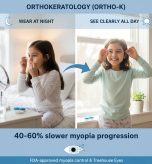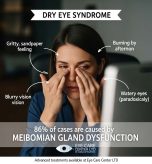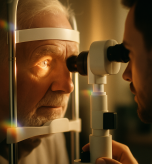When a child struggles with attention, focus, or keeping up in school, it’s natural for parents and teachers to wonder if it might be ADHD (Attention-Deficit/Hyperactivity Disorder). But what many families don’t realize is that these same challenges can sometimes be linked to a binocular vision disorder instead.
What is a Binocular Vision Disorder?
Binocular vision refers to how well the eyes work together as a team. If the eyes don’t align or coordinate properly, the brain struggles to merge the two images into one clear picture. This is called a binocular vision disorder (BVD).
Some common types include:
- Convergence insufficiency – difficulty keeping the eyes aligned when reading up close
- Strabismus – one eye turns in, out, up, or down
- Amblyopia (“lazy eye”) – reduced vision in one eye that isn’t corrected by glasses alone
Why It Gets Mistaken for ADHD
A child with a binocular vision disorder often looks distracted or restless, not because they don’t want to pay attention, but because their eyes and brain are working extra hard to process what they see.
Overlapping symptoms can include:
- Trouble focusing on reading or homework
- Skipping lines or losing their place while reading
- Headaches or eye strain after short periods of near work
- Difficulty with comprehension
- Frustration that may come across as “acting out”
Understandably, these behaviors can look a lot like ADHD.
The Value of a Comprehensive Eye Exam
A standard vision screening at school or the pediatrician’s office doesn’t usually check for binocular vision problems. That’s why a comprehensive eye exam is so important. It can uncover hidden vision issues that may be holding your child back.
The Good News: There are Solutions
If a binocular vision disorder is diagnosed, treatment is available and effective. Options may include:
- Specialized glasses or prism lenses
- Vision therapy to improve eye coordination
- Regular monitoring to track progress
With the right care, children often experience significant improvements in reading, focus, and comfort. Parents frequently share how relieved they feel when their child finally enjoys learning without the constant struggle.
A Final Thought for Parents
If your child has been struggling with attention or schoolwork, it’s not your fault—and it may not be ADHD. Sometimes, the answer is as simple as how the eyes are working together. A comprehensive eye exam can help provide clarity and peace of mind.
📞 Contact The Eye Care Center LTD today to schedule an appointment. We’re here to support you and your child every step of the way.


